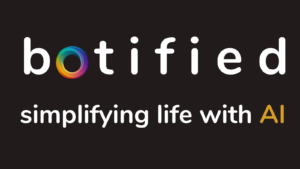Last week was an exhausting 😓 week in the world of AI. So many launches in the space and a lot of disruption. Here is the recap from last week’s launches.
Microsoft CEO Satya Nadella says Voice Assistants are Dumb 🤡
Are we just going to let the AI crisis happen? 🆘
Meta’s investment in AI – what does this mean to Metaverse? 🌌
Microsoft CEO Satya Nadella Trashes Company’s Voice Assistant, Says It Was ‘Dumb As A Rock’ Compared To Current AI (BENZINGA)
botified thoughts:
“Dumb as a Rock” or Catalysts for change: The evolution of Voice Assistants (opinion)
In the age of Artificial Intelligence, our lives have been revolutionized by the promise of digital companions that can simplify tasks and make our lives easier. Enter voice assistants like Siri, Alexa, and Cortana, hailed as the future of human-computer interaction. However, Microsoft CEO Satya Nadella recently called these voice assistants “dumb as a rock,” raising questions about the efficacy of these digital helpers and the future of voice-based AI.
As the tech world reels from Nadella’s brutally honest critique, one cannot help but wonder if this signals an important turning point in the development of AI. Have our attempts to create the ultimate voice-based companion been misguided, or is this simply a necessary step in the ongoing evolution of AI technology?
When voice assistants first entered the scene, they were celebrated as groundbreaking innovations. We marveled at the prospect of having a personal digital assistant that could answer questions, play music, and even control our smart homes. Fast forward a few years, and the illusion of the perfect digital helper has come crashing down. Users have grown increasingly frustrated with the limitations of voice assistants, as they often fail to understand complex instructions or provide accurate information.
Nadella’s candid admission that these assistants are “dumb as a rock” may be a wake-up call for the industry. While these tools may have seemed revolutionary at first, it is clear that there is still a long way to go before they reach their full potential.
Enter ChatGPT, the AI chatbot developed by OpenAI, in which Microsoft has invested a staggering $10 billion. As the co-creator of Siri, Adam Cheyer, points out, ChatGPT’s ability to understand complex instructions leaves existing voice assistants in the dust. The integration of ChatGPT-like skills into Microsoft’s Bing search engine could mark the beginning of a new era in AI development.
Perhaps the shortcomings of voice assistants like Siri, Alexa, and Cortana are not a failure, but rather a stepping stone toward a more advanced AI. These “dumb as a rock” tools may have served as catalysts for change, pushing developers to strive for a more sophisticated and intuitive AI.
As we reflect on Nadella’s provocative remarks, we must consider the broader implications for the world of AI. Are voice assistants destined to be relegated to the annals of history as a failed experiment, or can they serve as a valuable lesson in our quest for more intelligent and responsive AI systems? The future of AI may well hinge on our ability to learn from these early forays and embrace a new wave of innovation that pushes the boundaries of what we once thought possible.
Nadella’s scathing assessment of voice assistants may be a jarring reality check, but it also offers us an opportunity to reflect on the evolution of AI technology. As we continue to innovate and develop smarter, more capable AI systems, we must remember that sometimes, even the “dumbest” of rocks can spark the brightest of ideas.
Why Are We Letting the AI Crisis Just Happen? (The Atlantic)
botified thoughts:
Gary Marcus makes a strong case for the potential dangers of large language models and their impact on democracy. He writes how concerning it is that these models can create hallucinations and spread misinformation at such a scale. Marcus’s suggestion to watermark content or penalize misinformation produced on a large scale seem like plausible solutions. However, the idea of developing a new form of AI that can detect misinformation may take a long time to develop and may not be practical in the short term.
While it is true that large language models can be used to spread misinformation, it is not fair to blame the technology itself for the actions of bad actors. Instead, we should focus on the actions of these actors and hold them accountable for spreading harmful content. It is important to note that these models have many positive applications, such as improving natural language processing and helping with language translation. Instead of banning or heavily regulating these models, we should focus on improving transparency and accountability in how they are used. We should also educate the public on how to identify and avoid misinformation, rather than relying solely on technological solutions.
What will the 2024 election cycle look like with AI? Is democracy in peril in the United States?
Meta’s ‘year of efficiency’ brings lofty AI ambitions — and more mass layoffs (Marketing Dive)
botified thoughts:
Meta Platforms, the owner of Facebook and Instagram, recently announced its restructuring plan, which involves cutting an additional 10,000 jobs and doubling down on artificial intelligence (AI) ambitions. This is a smart move because AI has the potential to enhance user experiences across all of Meta’s products, like WhatsApp, Messenger, and Instagram DM. By leveraging generative AI in these chat clients, the company can create more creative and expressive tools that positively impact business results.
The company has already shown that its AI capabilities within its ads business can deliver more conversions year-over-year, indicating that there is significant potential for AI to save marketers money. While AI is not new for Meta, the company needs to demonstrate the payoffs from its investments in the technology to stay ahead of the competition. AI is not the only solution, and the company needs to show how it can improve its product portfolio in the short-term using AI.
Meta Platforms’ restructuring plan is a smart move, and its focus on AI can have a significant impact on the company’s future success. By building AI into every product, the company can enhance user experiences and impact business results positively. The company needs to continue investing in AI and demonstrate the payoffs from its investments to stay ahead of the competition.
Meta invested $13.7 Billion in 2022 in the Metaverse. What does this AI pivot mean to those investments?
Cool AI stuff
Visily is a platform that lets non-designers quickly create impressive wireframes for MVPs. It has pre-designed templates for web and mobile and AI tools to turn sketches and app images into customizable wireframes. Users can connect screens and components to show application flows and use Visily’s CSS code inspector to code app UI faster.
This platform lets users submit videos for translation and voice-over. It uses AI to transcribe, translate and create natural-sounding voice overs, with a team of QAs ensuring quality. It works for any industry, such as media, e-learning, enterprises and content creation.
LeiaPix Converter quickly turns 2D images into stunning 3D Lightfield images. Export to Leia Image Format, Side-By-Side 3D, Depth Map, or Lightfield Animation. Just upload an image to get your Lightfield upgrade.
Have a cool AI tool to share? Send it to us on Instagram, Twitter, or email and we’ll consider it for an upcoming publication!
AI media of the day
Latest Generative AI News: What You Need to Know – Twitter Spaces
On Friday 3/17, several AI professionals, enthusiasts, and creatives gathered on Twitter spaces to discuss the latest news in generative AI. It was a great conversation. Listen to their fascinating conversation below.
Below are the main topics discussed:
- GPT4 going multimodal (utilizing several different modes of media) – why does this matter?
- Google and Microsoft putting AI into their office suites – what does this mean to startups and you?
- Midjourney v5 – huge update to Midjourney discussed and what this means to creative AI.

Featured AI art of the day
This week, we’re focusing on testing Midjourney’s v5 engine. We will keep the prompts very simple and short to see what it can produce.
Prompt: multiple universes captured inside a bottle, realistic, –v 5

Want your art featured? Dm it to us on Instagram, Twitter, or email and we’ll consider it for an upcoming blog!





